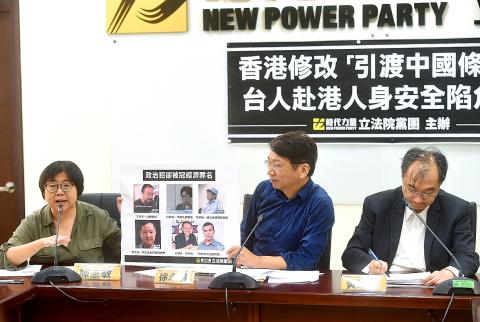Hong Kong Legislative Council members are considering amending the territory’s extradition laws to define Taiwan as part of China, the New Power Party (NPP) said yesterday.
If such amendments were passed, China would treat Taiwan as part of its jurisdiction and “more than 2 million Taiwanese who work and study in Hong Kong could face the same fate as Lee Ming-che (李明哲),” NPP Legislator Hsu Yung-ming (徐永明) said.
Lee, a Taiwanese democracy advocate, was arrested in March 2017 when entering China from Macau, and eight months later was sentenced to five years in prison for “subversion of state power.”

Photo: Chien Jung-fong, Taipei Times
The changes would not only raise the travel risk to Hong Kong, but also lead to greater self-censorship, he said.
The Hong Kong Security Bureau on Friday last week advised the council to amend the Fugitive Offenders Ordinance and the Mutual Assistance in Criminal Matters Ordinance, saying that it is necessary to include “other parts of the People’s Republic of China” to the areas in which the two laws can be applied to allow criminals to be delivered from Hong Kong to Taiwan, Hsu said.
While the proposal has received the support of many pro-China members of the council, when asked about the matter, Minister of Justice Tsai Ching-hsiang (蔡清祥) only said that it has not yet happened and promised to look into it, Hsu said.
Although the proposal is still being discussed, as it concerns the nation’s sovereignty, the Taiwanese government should express its stance on the issue and support a proposal from pro-democracy councilors to only deal with bilateral agreements on extradition between Taiwan and Hong Kong, he said.
The Ministry of Justice would ensure that cross-strait judicial cooperation is handled in an “equal, reciprocal and respectful manner,” and would reject any request that fails to meet those requirements, ministry official Liu Yi-chun (劉怡君) said.
In this particular case, the ministry cannot comment on the proposed amendments, because no draft bills have yet been revealed, she said.
The Mainland Affairs Council is aware of the proposals and hopes that the Hong Kong government would deal with the matter with caution and consider the interests of both sides, agency official Huang Ting-hui (黃廷輝) said.
“The government will not accept anything aimed at undermining the nation’s sovereignty,” he added.

CHAOS: Iranians took to the streets playing celebratory music after reports of Khamenei’s death on Saturday, while mourners also gathered in Tehran yesterday Iranian Supreme Leader Ayatollah Ali Khamenei was killed in a major attack on Iran launched by Israel and the US, throwing the future of the Islamic republic into doubt and raising the risk of regional instability. Iranian state television and the state-run IRNA news agency announced the 86-year-old’s death early yesterday. US President Donald Trump said it gave Iranians their “greatest chance” to “take back” their country. The announcements came after a joint US and Israeli aerial bombardment that targeted Iranian military and governmental sites. Trump said the “heavy and pinpoint bombing” would continue through the week or as long

TRUST: The KMT said it respected the US’ timing and considerations, and hoped it would continue to honor its commitments to helping Taiwan bolster its defenses and deterrence US President Donald Trump is delaying a multibillion-dollar arms sale to Taiwan to ensure his visit to Beijing is successful, a New York Times report said. The weapons sales package has stalled in the US Department of State, the report said, citing US officials it did not identify. The White House has told agencies not to push forward ahead of Trump’s meeting with Chinese President Xi Jinping (習近平), it said. The two last month held a phone call to discuss trade and geopolitical flashpoints ahead of the summit. Xi raised the Taiwan issue and urged the US to handle arms sales to

State-run CPC Corp, Taiwan (CPC, 台灣中油) yesterday said that it had confirmed on Saturday night with its liquefied natural gas (LNG) and crude oil suppliers that shipments are proceeding as scheduled and that domestic supplies remain unaffected. The CPC yesterday announced the gasoline and diesel prices will rise by NT$0.2 and NT$0.4 per liter, respectively, starting Monday, citing Middle East tensions and blizzards in the eastern United States. CPC also iterated it has been reducing the proportion of crude oil imports from the Middle East and diversifying its supply sources in the past few years in response to geopolitical risks, expanding

Pro-democracy media tycoon Jimmy Lai’s (黎智英) fraud conviction and prison sentence were yesterday overturned by a Hong Kong court, in a surprise legal decision that comes soon after Lai was jailed for 20 years on a separate national security charge. Judges Jeremy Poon (潘兆初), Anthea Pang (彭寶琴) and Derek Pang (彭偉昌) said in the judgement that they allowed the appeal from Lai, and another defendant in the case, to proceed, as a lower court judge had “erred.” “The Court of Appeal gave them leave to appeal against their conviction, allowed their appeals, quashed the convictions and set aside the sentences,” the judges